The people hoping to persuade UK to vote to stay in the EU
- Published
Meet the men and women who have been given the job of persuading Britain to stay in the EU in 23 June's referendum.

David Cameron - leading from the front
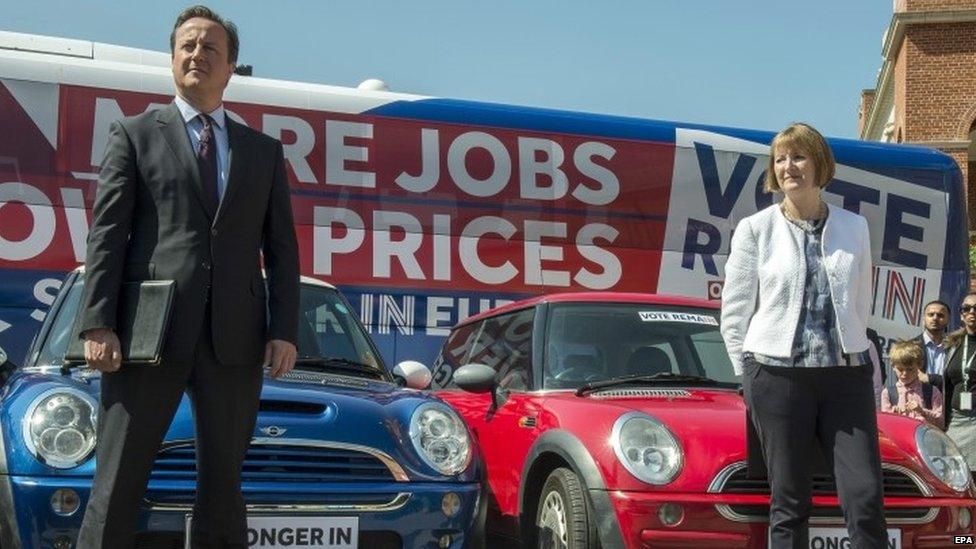
David Cameron has angered Tory eurosceptics by sharing platforms with other parties
David Cameron called the referendum and, with many commentators speculating that his political future rests on the outcome, he has taken centre stage in the campaign to remain in the EU.
The prime minister has devoted much of the past four months to taking his pro-EU message around the country, hammering home warnings about the economic risks of leaving and saying peace in Europe cannot be taken for granted.
He has angered some in his own party with his outspoken stance and tactics, accusing Leave supporters of spreading "scare stories", sharing a platform with Labour figures like Sadiq Khan and Harriet Harman and backing a controversial £9m pro-EU leaflet drop.
Mr Cameron, who has insisted that he will remain in Downing Street whatever the result, has said he will not debate directly against any other Conservatives head-to-head before 23 June so as not to inflame so-called "blue on blue attacks".

What is Britain Stronger in Europe?
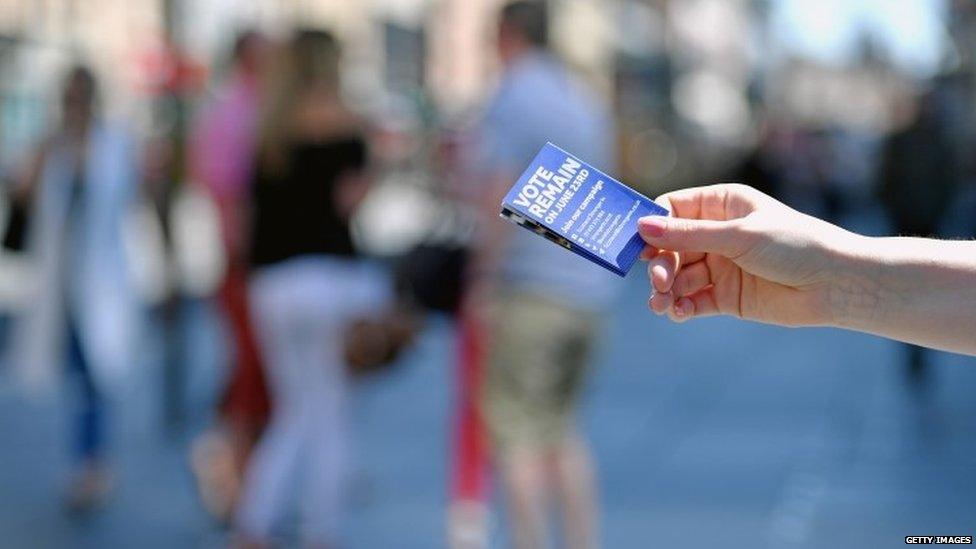
Britain Stronger in Europe, external was chosen as the official lead campaign to make the case for the UK remaining in the European Union.
It draws its support from across the political spectrum, including key figures from the Conservative Party, the Labour Party and the former leader of the Green Party.
The cross-party umbrella group was the only organisation to apply to the Electoral Commission for the status of flag bearer for the Remain side, which confers special financial benefits.
It is able to spend up to £7m during the campaign, including a £600,000 public grant for a free public mailshot and TV broadcasts. There are a number of other groups backing the Remain campaign but they have a spending limit of £700,000.

What does it do?
Britain Stronger in Europe has played a crucial role in shaping the referendum debate and taking on the arguments of its rival Vote Leave.
It has focused primarily on the economic benefits of the UK remaining in the EU, the enhanced global influence that membership brings for Britain and the uncertainty that will be caused by a vote to leave.
It is a Westminster-based group, which has the support of a plethora of pro-EU campaign groups, including the European Movement, Open Europe and the Centre for European Reform.
It has sought to broaden its appeal, particularly to younger and BME voters. Its board members include Megan Dunn, the president of the National Union of Students, theatre director Jude Kelly and former Channel 4 presenter June Sarpong.

Who funds it?
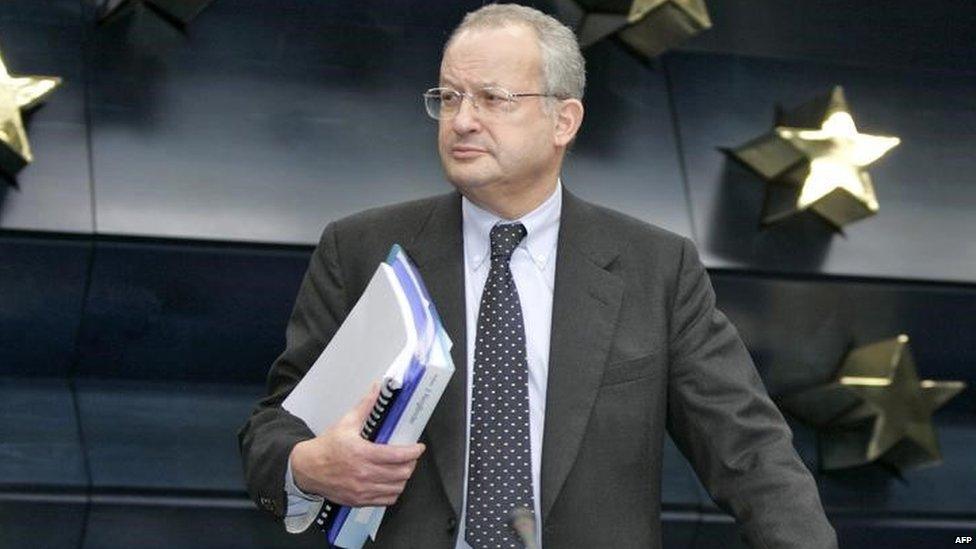
Lord Sainsbury is the Remain campaign's largest donor so far
The group's biggest donor so far has been Lord Sainsbury, the former supermarket magnate who was a science minister during the last Labour government. He gave Stronger In £2.3m between 1 February and 21 April.
There have also been significant contributions from the City.
Investment banks Goldman Sachs and Citi have said they will support the campaign with six-figure sums while hedge fund boss David Harding, who is on the board of the organisation, has given £750,000 so far.
Other donors include Travelex founder Lloyd Dorfman and property developer Nathan Kirsh.

The key players
George Osborne - Chancellor of the Exchequer
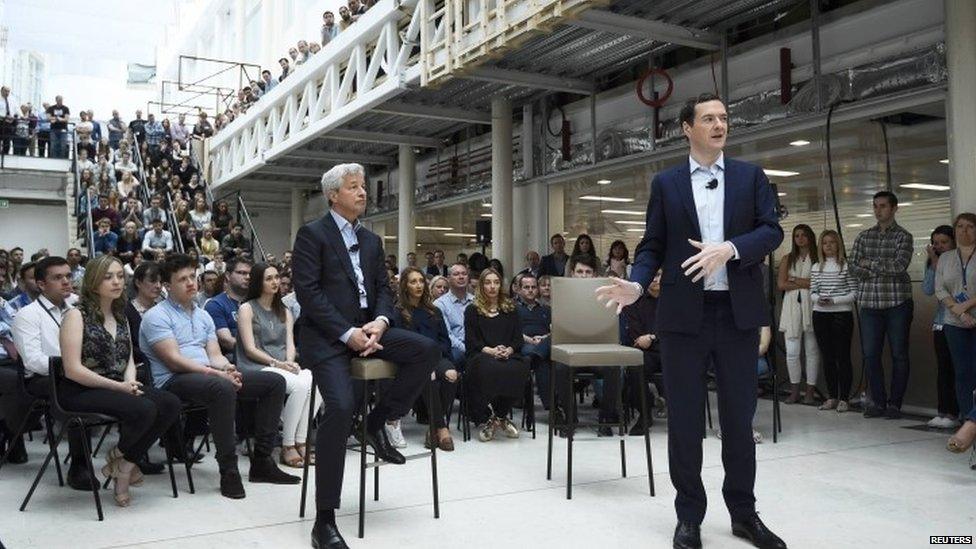
George Osborne's economic warnings have proved controversial
George Osborne has been a pivotal figure in the Remain campaign, personifying the government's view that the UK would be damaged economically by leaving the EU.
He has appeared alongside business leaders as they warned about the risk of job losses after Brexit and put his name to two controversial Treasury reports which painted a grim picture of the impact on jobs, growth, house prices and the pound of a vote to leave.
As the campaign progressed, his attacks on Leave have strengthened, labelling Nigel Farage's vision for the UK "mean and divisive"
Lord Rose - former chair of Marks and Spencer
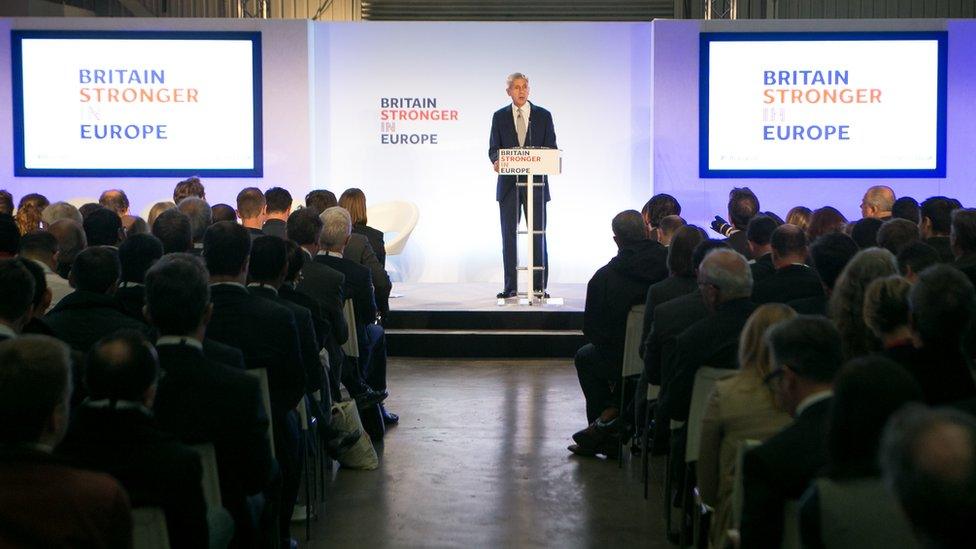
Stuart Rose has had a low profile during the campaign
The former chief executive of Burton Group, Argos and Arcadia Group, who became a Tory peer in 2014, is chair of Stronger In.
Launching the campaign last year, he said the EU was not perfect, but staying in was the "patriotic course for Britain". Since then, he has played a low-key role, working behind the scenes to court business support.
Critics have questioned whether such an establishment figure is what is needed to win over undecided voters and his sure-footedness and command of detail came under scrutiny when he appeared before MPs.
Will Straw - executive director
The son of former Labour home secretary Jack Straw, the Oxford graduate and former head of the National Union of Students worked for the IPPR think tank and as a Treasury adviser under Alistair Darling.
He attempted to enter Parliament last year but failed as he lost the Rossendale and Darwin seat in Lancashire by 5,654 votes. He has fielded tough questions on policy and sought to bring cross-party appeal.
Roland Rudd - Treasurer
The founder and chairman of financial PR firm Finsbury, he is a City networker with impeccable political contacts - one of his sisters is the Climate Change and Energy Secretary Amber Rudd, while he has numerous friends in New Labour circles.
He founded Business for a New Europe in 2006 to speak up on behalf of the benefits of EU membership but was on the losing side in the 2011 referendum on the voting system, when he backed the Alternative Vote.
Lucy Thomas - deputy director
A regular presence putting the Remain case on TV and radio, Lucy Thomas is a former BBC producer and Lib Dem press officer who held a variety of senior roles, including campaign director, for Business for New Europe before joining Britain Stronger in Europe.
Brendan Barber - former TUC boss
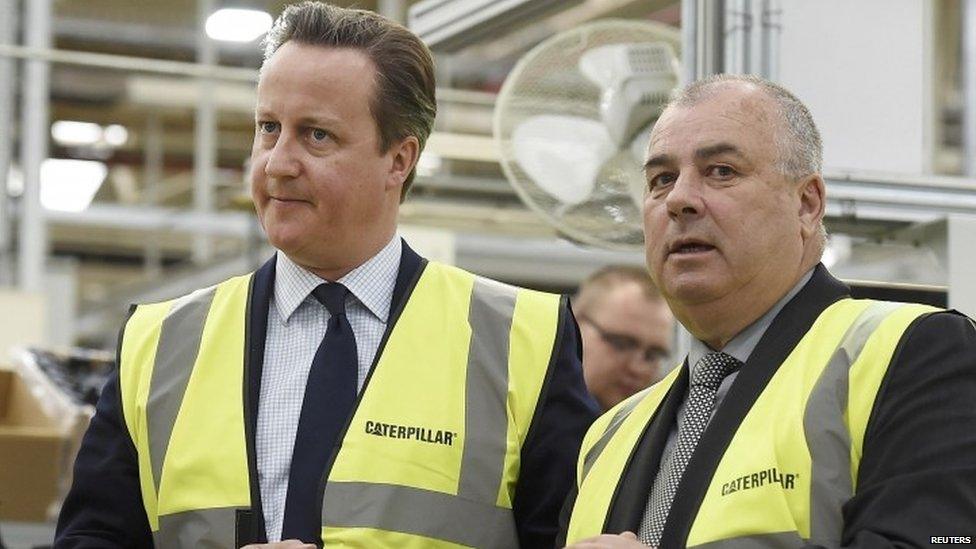
Most unions support a Remain vote - but there are concerns many blue collar voters may be leaning the other way
The former head of the Trade Union Congress is one of a dozen other figures on the organisation's board, including politicians, businessmen, entrepreneurs and broadcasters.
Mr Barber is responsible for liaising with the trade union movement, which is largely in support of EU membership and whose contribution will be vital if the In campaign is to be successful.
But there have been growing concerns about who is going to enthuse and mobilise the blue collar vote.

Other key Remain figures
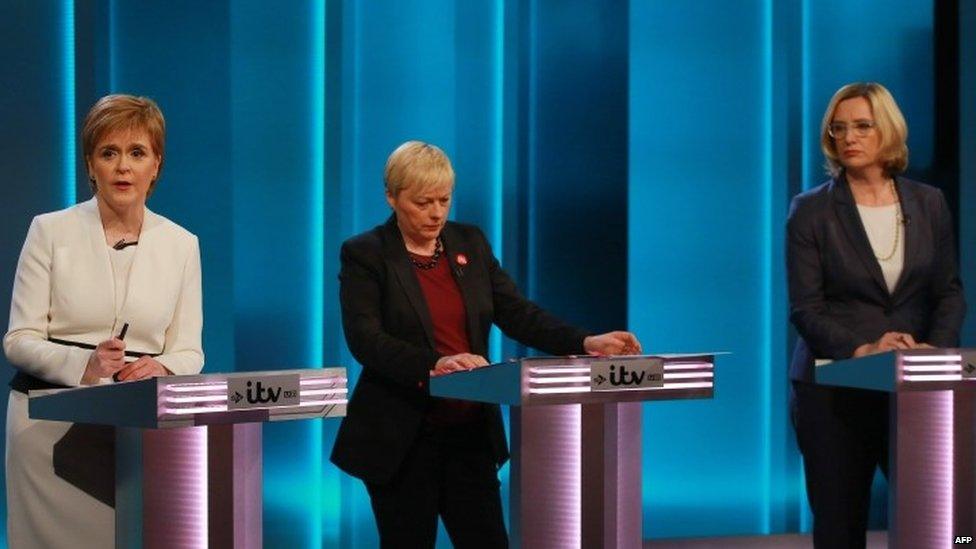
Nicola Sturgeon has led the campaign for a Remain vote in Scotland
There are a number of other groups linked to political parties supporting EU membership, although many of these have taken a back seat as the focus has been on splits in the Conservative Party.
The Labour In For Britain campaign, external is being fronted by ex-Home Secretary Alan Johnson, who promises to "put the country's future above party machinations". The Liberal Democrats, external say staying in the EU will keep the UK "prosperous, secure and relevant" while the Green Party, external says the UK will "flourish when we work together on the shared challenges we face", including the environment.
SNP leader Nicola Sturgeon, who is effectively leading the Remain campaign in Scotland, has warned David Cameron against fighting a "miserable, negative, fear-based" campaign elsewhere.
The Conservative Party is neutral on the issue of the referendum. More than 100 Tory MPs, including four Cabinet members, take the opposite view to Mr Cameron and want the UK to leave. Those that back Remain camp have their own Conservatives IN, external campaign.
There have also been pro-EU interventions from other high-profile figures, including ex-premiers Tony Blair, Gordon Brown and John Major, warning of the impact on the rest of the UK of a Leave vote.

What about Jeremy Corbyn?
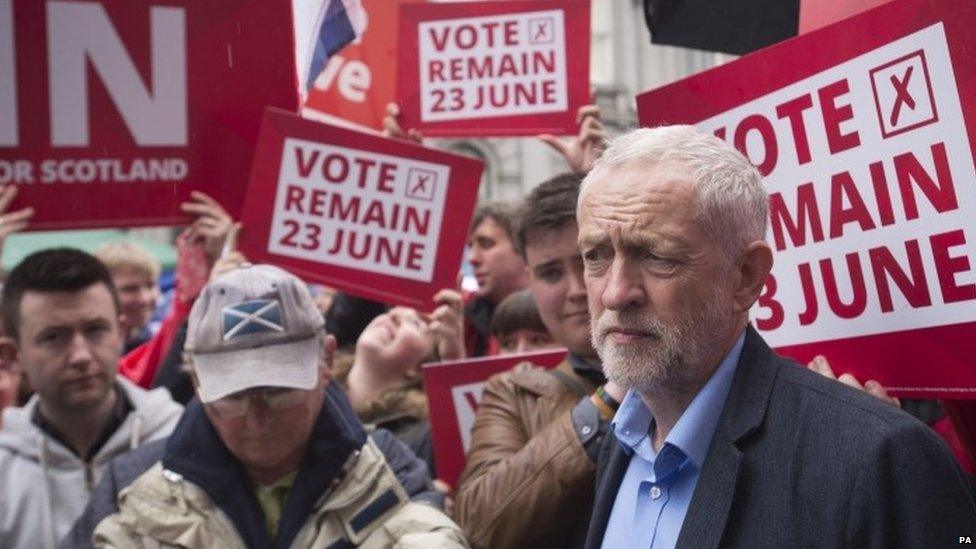
Jeremy Corbyn says he has a different vision of the EU than David Cameron and some within his own party
The Labour leader's role in the EU debate has been the subject of a huge amount of press attention and speculation.
He has made a number of speeches making the case for EU membership, focusing on the risk to workers rights and employment protections of a vote to Leave, and encouraging young people to register to vote.
But Mr Corbyn, who is more Eurosceptic than his predecessors and has said he rates his passion for the EU as seven out of 10, has had a lower profile than many in Labour would have liked and has declined to share a platform with figures from other parties.
Many of his allies are backing a separate campaign, Another Europe is Possible, external, accentuating the social benefits of being in the EU.
In the final 10 days of the campaign, Labour has mounted a "fight back" amid fears that many of its traditional supporters are leaning towards Leave, with Gordon Brown taking an increasingly high-profile role as he did during the 2014 Scottish independence referendum.

Referendum on the UK's future in the European Union
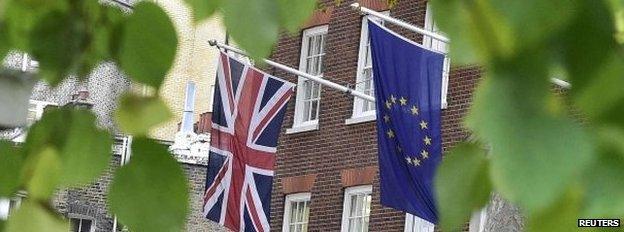
The UK is to have a referendum by the end of 2017 on whether to remain a member of the European Union or to leave. The vote is being proceeded by a process of negotiations in which the Conservative government is seeking to secure a new deal for the UK.
- Published13 April 2016
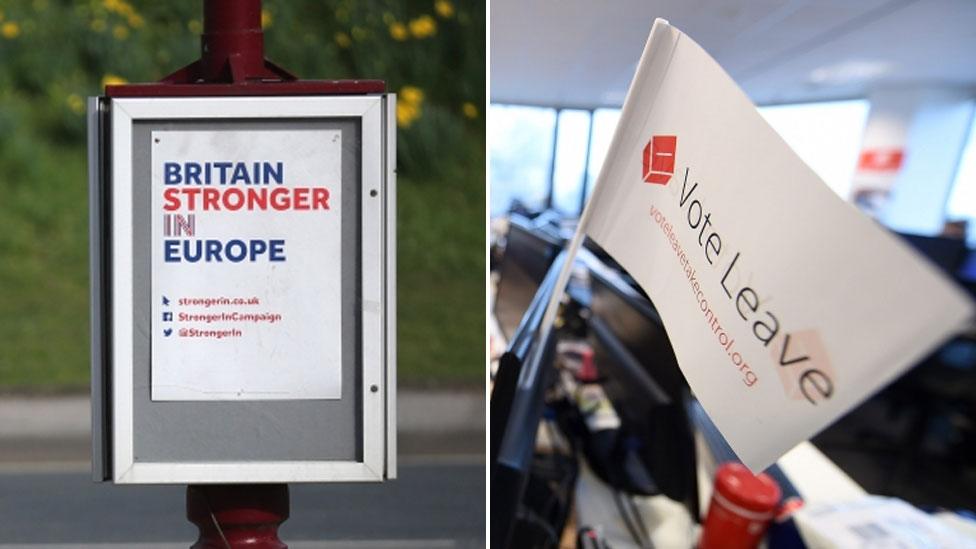
- Published14 March 2016
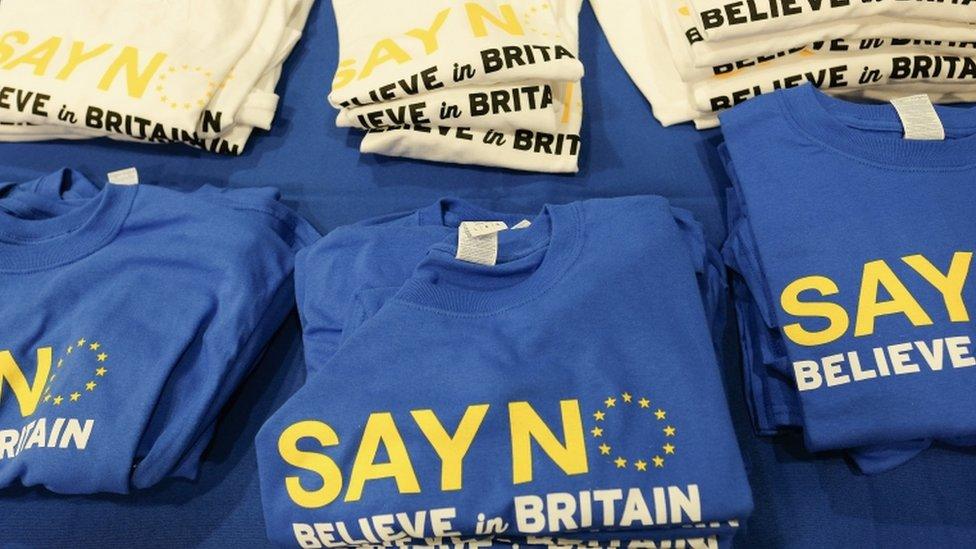
- Published12 October 2015
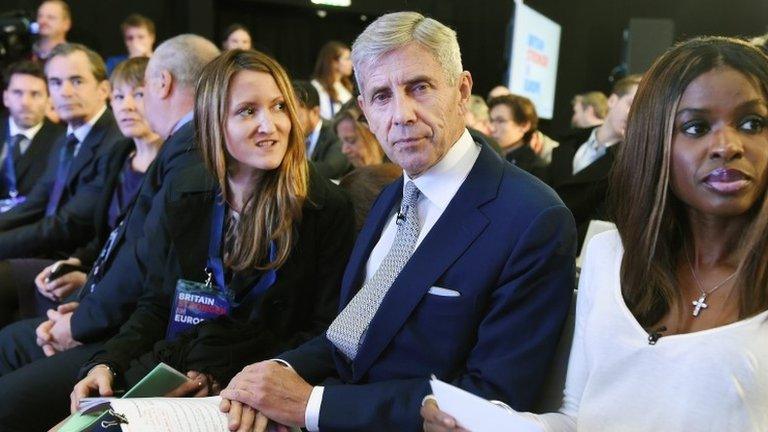
- Published30 December 2020
